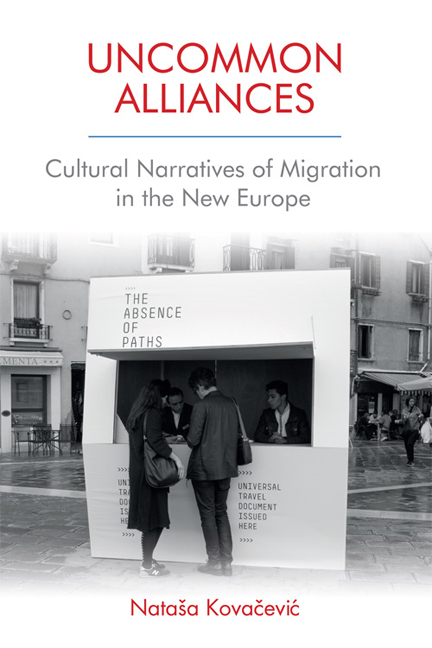Book contents
- Frontmatter
- Contents
- Acknowledgements
- Dedication
- Introduction
- 1 Performing the State: Artistic Re-Presentations of European Community
- 2 Alternative Hospitalities on the Margins of Europe
- 3 Colonial Spectres in Europe’s Historiography
- 4 Postcolonial and Postcommunist Contact Zones in a United Europe
- 5 Epilogue: Memories of Yugoslavia and Europe to Come
- Notes
- Bibliography
- Index
5 - Epilogue: Memories of Yugoslavia and Europe to Come
Published online by Cambridge University Press: 01 May 2021
- Frontmatter
- Contents
- Acknowledgements
- Dedication
- Introduction
- 1 Performing the State: Artistic Re-Presentations of European Community
- 2 Alternative Hospitalities on the Margins of Europe
- 3 Colonial Spectres in Europe’s Historiography
- 4 Postcolonial and Postcommunist Contact Zones in a United Europe
- 5 Epilogue: Memories of Yugoslavia and Europe to Come
- Notes
- Bibliography
- Index
Summary
As we have seen, Dubravka Ugrešić re-members the dismembered Yugoslavia through a rhetorical construction of a collective firstperson Yugoslav identity articulated in a language described only as ‘ours’. Despite the country's rich diversity of languages and dialects, she suggests that the conceptual tools of liberal multiculturalism which has become the dominant way of explaining the multi-ethnicity of socialist Yugoslavia in the wake of its demise misses not only the country's idiosyncratic economic and political system, but also the extent to which Yugoslavia cannot be reduced to a collection of distinct and internally consistent, albeit interconnected, cultural or linguistic groups. Ugrešić's frustration at being unable to explain this to her European interlocutors is symptomatic of the larger problems of the (mis)translations of political terminology: because the state itself was officially a federation of ‘nations and nationalities’, the separate nation states that resulted from it seem to have merely deducted the federation part. To contest this reductive understanding, Ugrešić rebuilds the diverse Yugoslav community as an event of singularities indiscriminately sharing one another's languages, without the need to (mis)recognise one's ‘self’ in the ‘other’. Forking her tongue, she suggests a host of identifi- cations that coexist fluidly and in-common, without clearly defining relationships or groups. This understanding of community calls into question the adequateness of popular rhetoric about promoting cultural understanding or negotiating religious differences in the Balkans, which presumes the (co)existence of always-already distinguishable groups defined by various identity markers as the central feature of the region.
While Ugrešić by no means idealises the former Yugoslavia as a state, her discourse is nonetheless more nostalgic than that employed by the NSK State in Time project, discussed at the beginning of this book. Drawing parallels between Yugoslavia and the European Union, the NSK alert us to the totalitarian potential that exists in the very conceptualisation of the state and the tools it employs to ensure its survival. Nonetheless, the type of sociality in-common which Ugrešić remembers, and which implies a degree of social justice and egalitarianism, is not entirely monopolised by hegemonic representations of the state in so far as it has survived its demise. The last decade, especially, has seen the phenomenon of intensifying recreations of a Yugoslav ‘community without community’ which emanates from the absence of the state, often through a disidentifi- cation from state signifiers.
- Type
- Chapter
- Information
- Uncommon AlliancesCultural Narratives of Migration in the New Europe, pp. 206 - 221Publisher: Edinburgh University PressPrint publication year: 2018



